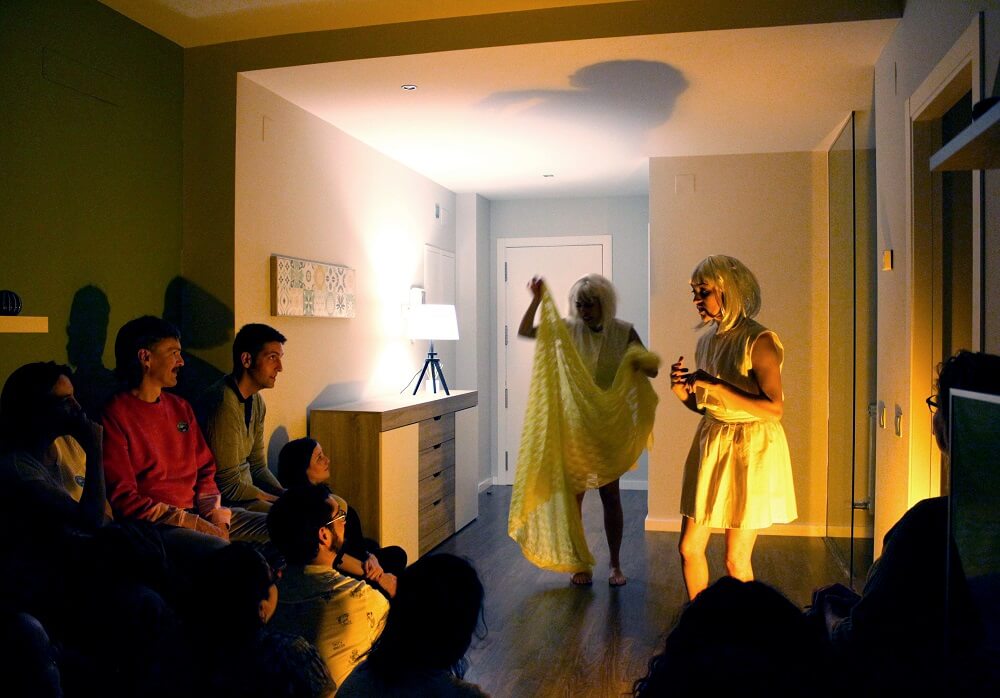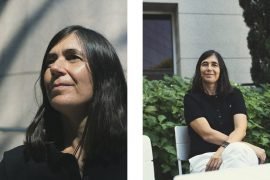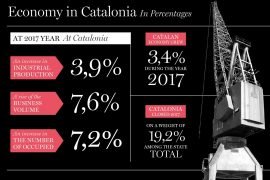8:40 pm on a Saturday evening. Twenty-five people gather beside Pilar Pàmpols, who is carrying a board with a drawing of a bed and which reads “Hors Lits.” They are all standing in western Catalonia’s Lleida city centre, but there is an underground atmosphere to it all. Before beginning, Pilar reveals the mystery: “we will follow an itinerary of four artistic performances that take place in four apartments in the city,” and she reads out the attendance register.
At nine o’clock, the pilgrimage through the streets of the Balàfia district begins. First stop: Sílvia’s home, an apartment on the fifth floor of an old building on Carrer Pi i Margall. Some opt for the lift, but most go up the stairs. Once inside, the public scatters and they sit where they can, on chairs, sofas and pillows in the living room, a bit cramped for that many people, but undeniably cosy. In this homely atmosphere, Quarta Paret, a fledgling company out of Lleida’s Aula de Teatre drama school, begin their play In-fidelitats (In-fidelities). At first, the audience exchange amused and bemused looks, but then centre their attention on the vaudeville.
Four artistic performances, four apartments and an itinerant audience. That is the basis of the international Hors Lits network which has its origin in Montpellier. Barcelona was a pioneer in implementing this type of travelling art show in Catalonia over 7 years ago, and other Catalan towns such as Mollet del Vallès, Vilafranca, Vila-Seca, and Lleida have joined, with Vilassar de Mar premiering this year. In Lleida the organisers are Pilar, Àngel and Nico. All three came into contact with Hors Lits through Elodie, one of the driving forces behind the Barcelona Colectivo Suelto association, which began staging home shows in 2010.
Hors Lits comes out with the good weather, in spring and autumn. In Lleida they make a double tour: two days with two routes per night and with a maximum audience of 200 people. “It is the fourth edition we are holding and we are overwhelmed by the positive welcome it is receiving,” explains Àngel, who this time is also turning over his living room to host Fholia Teatre’s show Hay demasiadas flores (There Are Too Many Flowers).
Eréndira and Paola are members of this Barcelona-based experimental theatre company. “For us it is a very rewarding experience because it lets us to open ourselves to other kinds of spaces, outside the traditional theatres where we have always worked, and we also work with other tools, such as improvisation and direct contact with the public. They allow much greater play, which in a theatre would not be possible,” adds Paola. For them, it has also been a way to make new friends in the artistic world, as performers live with their hosts for a few days, while they opt for alternative formats that enrich their professional background.
On the other side of things, the format is also a success. “We have opened our house voluntarily and we have artists sleeping on the sofa, which as well as being their bed is part of the improvised stage,” explains Àngel.
The stroll from one home to the next is also part of the function: the audience share feelings and points of view, while anticipation grows, going in an instant from one format and one story to others that are wholly different. The third stage of the route is located ten minutes on foot from Àngel and Nico’s place. A girl invites the audience to a vermouth as they come in. Unbeknown to the audience, the performance is already under way. A few minutes into the Lleida theatre company Vermut Teatre’s Va ser llavors quan t’ho vaig dir (It Was Then When I Told You), the two leading characters begin to evoke their friendship over time, as the public discovers an unexpected secret…
After the performances, the urban pilgrimage ends at Olaf’s house. This is on the ground floor in one of the old alleys in the neighbourhood, with a large dining room that allows the dancers of the Barcelona company Tan lluny to stage the text of Gemma Almagro and the choreography of Tot està bé (Everything is OK). The director, Artur Villalba, recognises “that it is an intense exercise for both performers and the public, and that proximity makes a for stronger relationship.”
Once the very varied genre of shows has ended, the four groups meet in a neighbourhood bar to share the experience and to chat with the artists. The atmosphere is friendly, we could say even close. People introduce themselves, exchange their phone numbers and transmit sensations. Everyone can share what they have experienced. “Going to see theatre in people’s homes is attractive: you enter their dining room or living room, sit on the floor or in a chair, if you are lucky, and for less than half an hour you get inside a performance which you know nothing about. Minimal props and scant sets. That is, actors and actresses who stake everything on themselves. Not all works give you the same nor will you like them in the same way. But the proposal as a whole is worthwhile,” says Judit, one of the participants, of her experience.
A new approach to the artistic form
The expression Hors Lits follows on from the concept of a dance solo on a bed that Leonardo Montecchia, the founder and a fundamental mover of this group of artists, staged. “This is a sort of franchise where everything the organisers do is for the love of art, without charging anything, and the same rules must be followed everywhere,” says Pilar Pàmpols. “It started by being small, and over the years it has grown larger than we expected. Since we’ve been doing it in Lleida, there have always been people on the waiting list,” she adds. Hors Lits includes all the performing arts (theatre, dance, music, visual arts and staged arts, poetry, etc.). Local artists are given priority but there are always guest performers from outside the province. The owners of the spaces, called hosts, offer their homes for free, the organisers work voluntarily and the artists participate pro bono. The hat does of course end up being passed around the audience and the proceeds are distributed equally among the performers.




















